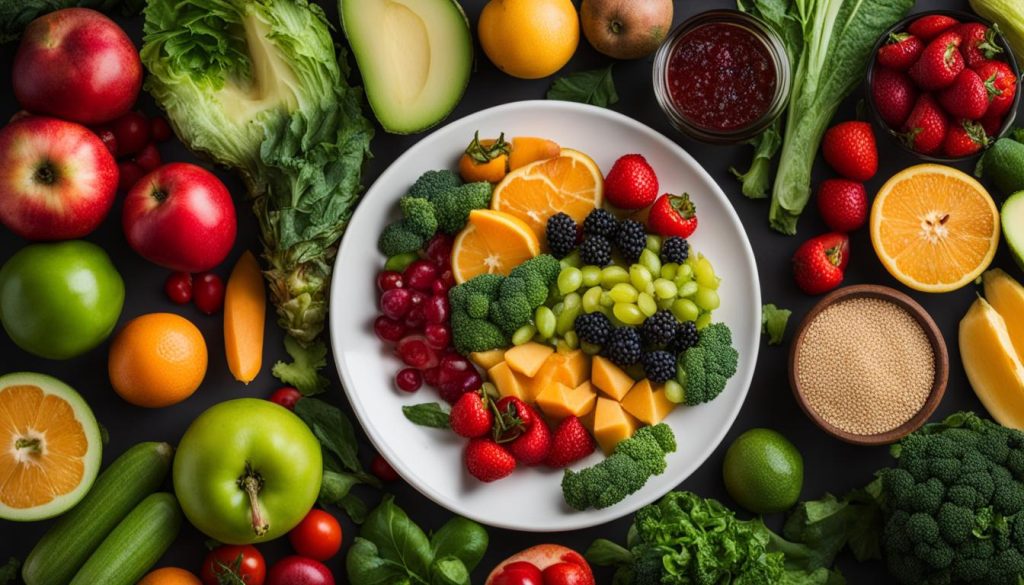All About the Lacto Vegetarianism Diet. A Simple Guide!

Welcome to my article all about the lacto vegetarianism diet. In this guide, I will provide you with all the information you need to know about this plant-based diet. Whether you're already following a vegetarian diet or considering making the switch, this article will give you valuable insights into lacto vegetarianism, its benefits, potential downsides, and the foods to include and avoid in your diet.
Key Takeaways:
- Lacto vegetarianism is a diet that excludes meat, poultry, seafood, and eggs but includes dairy products.
- A well-planned lacto vegetarian diet can improve heart health, blood sugar control, aid weight loss, and reduce the risk of certain types of cancer.
- It is important to ensure proper nutrition balance to avoid nutrient deficiencies.
- Include a variety of plant-based foods, dairy products, and vegetarian protein sources in your lacto vegetarian diet.
- Avoid meat, poultry, seafood, and eggs while following a lacto vegetarian diet.
What is a Lacto-Vegetarian Diet?
https://www.youtube.com/watch?v=pgyNf3fApR0
A lacto-vegetarian diet is a variation of vegetarianism that excludes meat, poultry, seafood, and eggs, but includes dairy products. This means that individuals following a lacto-vegetarian diet consume a plant-based diet along with milk, cheese, yogurt, and other dairy products. It is a popular choice for those who want to reduce their consumption of animal products while still enjoying the nutritional benefits of dairy.
Vegetarianism, in general, has gained popularity due to various reasons such as ethical concerns, health benefits, and environmental impact. By adopting a lacto-vegetarian diet, individuals can reap the benefits of a plant-based lifestyle while still acquiring essential nutrients from dairy products.
Following a lacto-vegetarian diet is not only beneficial for personal health, but it also has a positive impact on the environment. It has been estimated that the production of animal products contributes significantly to greenhouse gas emissions and deforestation. By choosing a lacto-vegetarian diet, individuals can reduce their carbon footprint and contribute to a more sustainable future.
Environmental Impact
The environmental impact of our food choices has become a growing concern in recent years. The production of meat and other animal products requires vast amounts of resources such as land, water, and feed. This puts a strain on the environment and contributes to issues like deforestation, water pollution, and habitat destruction.
By adopting a lacto-vegetarian diet, individuals can make a positive impact on the environment. Dairy products have a lower environmental footprint compared to meat and other animal products. This is because dairy production requires less land and water, and produces lower greenhouse gas emissions. By reducing the consumption of meat and increasing the intake of dairy products, individuals can contribute to a more sustainable food system.
Overall, a lacto-vegetarian diet offers individuals the opportunity to embrace a plant-based lifestyle while still enjoying the nutritional benefits of dairy products. It is a choice that not only benefits personal health but also has a positive impact on the environment. By making conscious food choices, individuals can contribute to a healthier and more sustainable future.
Benefits of a Lacto-Vegetarian Diet

Following a balanced lacto-vegetarian diet offers a multitude of benefits for overall health and well-being. Several studies have shown that this plant-based diet can significantly improve heart health by lowering cholesterol levels and reducing blood pressure. By excluding meat, poultry, and seafood while incorporating a variety of dairy products, lacto-vegetarians can enjoy the advantages of a diet that promotes cardiovascular well-being.
A lacto-vegetarian diet also plays a pivotal role in blood sugar control. With a focus on consuming whole foods and avoiding high-sugar processed foods, lacto-vegetarians can maintain stable blood sugar levels. This is particularly beneficial for individuals with diabetes or those at risk of developing the condition. By choosing plant-based sources of carbohydrates and focusing on fiber-rich foods, lacto-vegetarian diets can help regulate blood sugar levels effectively.
Weight loss is another prominent benefit associated with a lacto-vegetarian diet. By consuming fewer calories and incorporating more plant-based fiber into their meals, lacto-vegetarians can achieve and maintain a healthy weight. The high fiber content of fruits, vegetables, legumes, and whole grains helps promote feelings of fullness and reduces the likelihood of overeating. For those aiming to shed excess pounds, a lacto-vegetarian diet can be an effective approach to weight management.
The reduction of cancer risk is an additional advantage that a lacto-vegetarian diet has to offer. Numerous studies have shown that plant-based diets, including lacto-vegetarian diets, can lower the risk of certain types of cancer, such as colorectal and breast cancer. The abundance of antioxidants, phytochemicals, and fiber in plant-based foods is believed to contribute to this protective effect. By choosing a lacto-vegetarian lifestyle, individuals can make dietary choices that may reduce their risk of developing cancer.
"The lacto-vegetarian diet provides a range of health benefits, including improved heart health, better blood sugar control, weight loss, and reduced cancer risk. By focusing on nutrient-dense plant-based foods and incorporating dairy products, individuals can enjoy the advantages of this diet while supporting their overall health and well-being." - Dr. Jane Lee, Nutrition Specialist
Potential Downsides of a Lacto-Vegetarian Diet

A lacto-vegetarian diet can offer numerous health benefits, but it is important to be aware of potential downsides as well. One of the main concerns is the risk of nutrient deficiencies. Since meat, poultry, and seafood are excluded from the diet, it is crucial to find alternative sources of essential nutrients such as protein, iron, zinc, vitamin B12, and omega-3 fatty acids.
Protein, for example, is essential for muscle growth and repair, as well as the production of enzymes and hormones. While dairy products can provide some protein, it may be necessary to incorporate plant-based protein sources like tofu, tempeh, and legumes into the diet to ensure an adequate intake. Iron and zinc, important minerals for overall health, are typically found in abundance in meat and seafood. Vegetarians can obtain these nutrients from plant-based sources such as legumes, whole grains, nuts, and seeds, but it may require careful meal planning.
It is important to pay attention to diet quality and incorporate a variety of whole foods to prevent nutrient deficiencies."
Foods to Eat on a Lacto-Vegetarian Diet
A lacto-vegetarian diet is abundant in a wide variety of plant-based foods that provide essential nutrients for overall health. Here are some key foods to include in your lacto-vegetarian diet:
Fruits and Vegetables:
Fill your plate with an assortment of colorful fruits and vegetables. These plant-based foods are rich in vitamins, minerals, antioxidants, and fiber. Include a mix of leafy greens, berries, citrus fruits, cruciferous vegetables, and root vegetables to ensure a diverse range of nutrients.
Legumes:
Legumes, such as beans, lentils, and chickpeas, are excellent sources of plant-based protein, fiber, iron, and other essential nutrients. They provide a satisfying and nutritious addition to meals. Try adding them to soups, stews, salads, or even as a meat substitute in recipes.
Dairy Products:
As a lacto-vegetarian, dairy products play a crucial role in your diet. Include milk, yogurt, cheese, and butter for their calcium, protein, and vitamin D content. Opt for low-fat or non-fat dairy options to keep the saturated fat intake in check.
Healthy Fats:
Include healthy fats from plant sources, such as nuts, seeds, and avocados. These foods provide essential fatty acids, including omega-3s, which are important for brain health and inflammation control. Sprinkle some chia seeds, flaxseeds, or almonds on top of salads or incorporate avocado into sandwiches and wraps for a dose of healthy fats.
By incorporating a variety of fruits, vegetables, legumes, and dairy products into your lacto-vegetarian diet, you can ensure a well-rounded and nutritious eating plan. Remember to focus on whole foods and make choices that align with your health goals and preferences.
Foods to Avoid on a Lacto-Vegetarian Diet
When following a lacto-vegetarian diet, there are certain foods that should be avoided. This diet excludes meat, poultry, seafood, and eggs, so it's important to be mindful of these restrictions when planning meals.
"As a lacto-vegetarian, I choose to avoid all forms of meat, including beef, pork, chicken, and turkey," says nutrition expert, Lisa Johnson. "I also steer clear of seafood such as fish and shrimp, as well as eggs."
It's worth noting that some food products may contain hidden animal-derived ingredients, making it essential to read food labels carefully. "Ingredients like gelatin and lard, which are derived from animal sources, should also be avoided," adds Johnson.
Quote:
"Following a lacto-vegetarian diet means being aware of the foods you need to avoid," says Johnson. "By doing so, you can ensure that you're sticking to the principles of the diet while maintaining a balanced and nutritious eating plan."
By being mindful of the foods to avoid, lacto-vegetarians can ensure they are sticking to their dietary principles and enjoying the health benefits associated with this plant-based lifestyle.
Conclusion
In conclusion, the lacto-vegetarian diet offers a range of health benefits that make it an attractive choice for many individuals. By eliminating meat, poultry, seafood, and eggs while including dairy products, this plant-based diet provides flexibility and promotes overall well-being.
The health benefits of a lacto-vegetarian diet are significant. Research has shown that it can improve heart health by lowering cholesterol levels and reducing blood pressure. Additionally, it supports blood sugar control and aids in weight loss, making it an excellent choice for those looking to manage these conditions.
However, it is essential to ensure that a lacto-vegetarian diet is properly balanced to avoid nutrient deficiencies. While meat, poultry, and seafood are important sources of nutrients like protein, iron, zinc, vitamin B12, and omega-3 fatty acids, these can be obtained from alternative food sources or supplements. It is crucial to pay attention to the quality of the diet and incorporate a wide variety of whole foods to maintain nutrient balance.
Incorporating a lacto-vegetarian diet into your lifestyle can be a rewarding choice, offering numerous health benefits while still allowing for flexibility and variety. By focusing on a balanced and diverse range of plant-based foods and dairy products, you can reap the benefits of this diet and enjoy improved health and well-being.
FAQ
What is a lacto-vegetarian diet?
A lacto-vegetarian diet excludes meat, poultry, seafood, and eggs, but includes dairy products.
What are the benefits of a lacto-vegetarian diet?
A well-planned lacto-vegetarian diet can improve heart health, promote blood sugar control, aid weight loss, and reduce the risk of certain types of cancer.
What are the potential downsides of a lacto-vegetarian diet?
A lacto-vegetarian diet may increase the risk of nutrient deficiencies if not properly planned.
What foods should I eat on a lacto-vegetarian diet?
A lacto-vegetarian diet should include a variety of plant-based foods such as fruits, vegetables, legumes, whole grains, and dairy products.
What foods should I avoid on a lacto-vegetarian diet?
Foods to avoid on a lacto-vegetarian diet include meat, poultry, seafood, and eggs.
Is a lacto-vegetarian diet healthy?
A well-planned lacto-vegetarian diet can be healthy and provide numerous health benefits, but it is important to ensure proper nutrient balance.